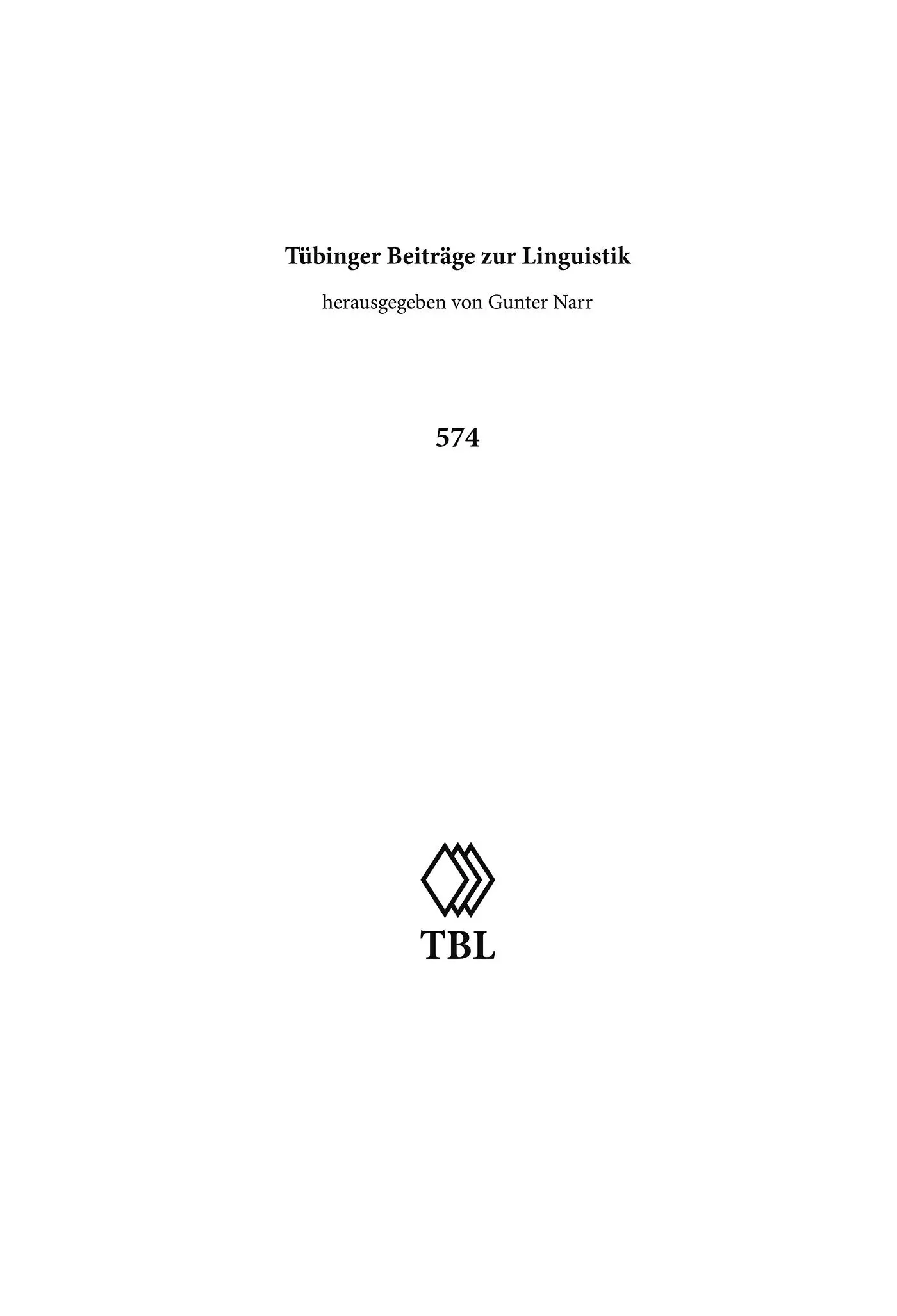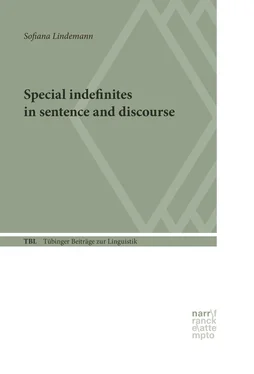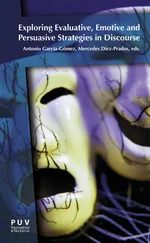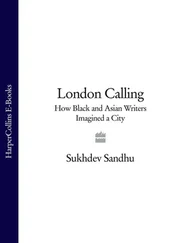
Sofiana Lindemann
Special indefinites in sentence and discourse
Narr Francke Attempto Verlag Tübingen
[bad img format]
© 2020 • Narr Francke Attempto Verlag GmbH + Co. KG
Dischingerweg 5 • D-72070 Tübingen
www.narr.de• info@narr.de
Das Werk einschließlich aller seiner Teile ist urheberrechtlich geschützt. Jede Verwertung außerhalb der engen Grenzen des Urheberrechtsgesetzes ist ohne Zustimmung des Verlages unzulässig und strafbar. Das gilt insbesondere für Vervielfältigungen, Übersetzungen, Mikroverfilmungen und die Einspeicherung und Verarbeitung in elektronischen Systemen.
ISBN 978-3-8233-8381-9 (Print)
ISBN 978-3-8233-0210-0 (ePub)
I would like to thank Klaus von Heusinger, who fostered my decision to become a linguist throughout the years of my studies at the University of Stuttgart. I am grateful for the fruitful and inspiring discussions we had.
I am dearly indebted to Elsi Kaiser, who patiently assisted me and provided insightful advice. During my stay at the Linguistics Department at the University of Southern California, Los Angeles, I was particularly impressed by her gift to inspire her students (including myself) and increase their appetite and knowledge in psycholinguistics.
Many thanks to my colleagues and friends at the Department of Linguistics at the University of Stuttgart, namely Regine Brandtner, Annika Deichsel, Cornelia Ebert, Ljudmila Geist, Dolgor Guntsetseg, Daniel Hole, Elena Karagjosova, Udo Klein, Elisabeth Löbel, Edgar Onea and Johannes Wespel. I am grateful to have been given the chance to work in such a friendly, warm and international environment.
I am thankful for the financial support by a grant of the Romanian Ministry of Research and Innovation, CNCS-UEFISCDI, project number PN-III-P1-1.1-TE-2016-1241, within PNCDI III.
This work was supported in part by the collaborative research center SFB 732 “Incremental Specification in Context” funded by the German Science Foundation (DFG).
My family and friends provided advice and encouragement at all hours and in all matters from lesser or greater distance. Thank you for your unconditioned support.
This book is about particular types of indefinite noun phrases that give structure to the discourse in terms of predictive expectations. Indefinite noun phrases are nominal expressions with a descriptive part and a special determiner form in those languages that have developed one. Typical examples of English indefinite noun phrases include, but are not limited to: a man, this man, several men, a certain man, some men, cardinals, the zero of bare plurals, partitives, and, according to some analyses, noun phrases headed by the morpheme any (Horn 1999, among others).
In the discussions starting with early work in the philosophical oriented tradition (Frege 1892, Russel 1905) and continuing with more recent, linguistic oriented proposals (Fodor and Sag 1982, Farkas 1994, 2002, Kamp and Bende-Farkas 2006), the question about the properties, uses, and function(s) of indefinite noun phrases has been answered in several ways. From a semantic point of view, one of the most basic properties that indefinite noun phrases share is existential quantification, which can be paraphrased as “there exists” or “there is at least one”. That means that the predicate within the scope of existential quantifiers is true for at least one value of the predicate variable. Consider the clause in (1), which describes a simple transitive event and in which the indefinite noun phrases a dog and some dog have existential force. This entails that the sentence is true if at least one entity is a dog and is in the garden.
| (1) |
A dog/ some dog is in the garden. |
In addition to asserting existential generalization, indefinite noun phrases display another characteristic that pertains to structuring the information in a paragraph, rather than to the truth conditions of a clause. The so-called Novelty Condition captures the property of indefinite noun phrases to introduce new and unfamiliar entities in the discourse (Kamp 1981, Heim 1982, among others). With respect to this property, indefinite noun phrases behave differently compared to other types of referring expressions (e.g. definite noun phrases), which are used to refer back to entities that have been previously introduced in the discourse and refer to discourse-old entities.
Besides existential quantification and novelty of reference, the notion of specificity has played a crucial role in the analysis of indefinite noun phrases as well (Fillmore 1967, Karttunen 1969, Partee 1970, Kripke 1977, Ludlow and Neale 1991, Kamp 1981, Farkas 2002, von Heusinger 2002, 2011). In pre-theoretical terms, a speaker uses a specific indefinite noun phrase as an expression of his intention to refer to a particular referent he “has in mind”. Specificity does not describe particular aspects that apply to all indefinite noun phrases in a unitary way, but rather distinguishes between a variety of uses and readings of indefinite noun phrases. Given the notoriety of the notion of specificity in the discussions involving indefinite noun phrases, it is not surprising that it is employed in investigations of different phenomena cross-linguistically (Enç 1991, Farkas 2002, von Heusinger 2011).
Another line of research has analysed different types of referring expressions in terms of activation and accessibility. The starting point for such investigations is the observation that human communication is not an arbitrary exchange between different speakers in the sense that interlocutors do not randomly switch between different types of referring expressions during the process of referring. Rather, referring expressions are used to introduce and continue reference to particular entities with certain referential properties, but also with particular discourse properties. According to this view, each type of referring expression is associated with one particular referent, which is selected from a list of discourse referents that are ranked with respect to their activation or accessibility. The general assumption is that there is an inverse relation between the explicitness of the anaphoric expression (in terms of descriptive, lexical, and phonological material) and the accessibility or prominence of the antecedent expression. Reduced types of referring expression most often correlate with accessible referents, while the opposite holds for more explicit types of referring expressions. For example, it was shown that a referring expression is likely to be associated with an accessible antecedent, if it is realized as a phonologically reduced form. The personal pronoun er (‘he’) in the second sentence of (2a) is more readily interpreted as coreferring with the subject ein Student (‘a student’) than with the object einen Professor (‘a professor’), even though both interpretations are felicitous. In contrast, the demonstrative pronoun der (‘this’) in (2b) cannot be linked to the subject or topic of the sentence, but, instead, can only be co-indexed with the second referent introduced, einen Professor (‘a professor’) (Bosch, Katz and Umbach 2007, Kaiser and Trueswell 2008).
| (2) |
(a) |
Ein Student 1begrüßt einen Professor 2. Er 1> 2sagt… |
|
|
a student greets a professor. He says… |
|
(b) |
Ein Student 1begrüßt einen Professor 2. Der* 1, 2sagt… |
|
|
a student greets a professor. DemPron says… |
|
|
‘A student greets a professor. He says […].’ |
The use of a particular type of referring expression depends upon the accessibility of its associated referent, which is in turn computed based on the status retained by this referent in the immediately preceding discourse. As indefinite noun phrases generally do not have a discourse history as they do not refer back to an antecedent, they have been either left unaccounted for, or they have been associated with referents ranked lowest in accessibility or activation (Gundel, Hedberg & Zacharski 1993, Ariel 2001).
Читать дальше













